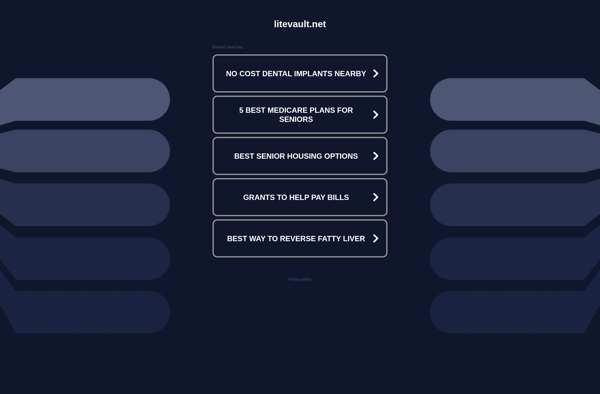LiteVault

LiteVault: Secure Password Manager
LiteVault is a lightweight and easy-to-use password manager that allows you to securely store passwords, notes, and more. It features client-side encryption, cross-platform support, and synchronization capabilities.
What is LiteVault?
LiteVault is a password manager application designed to help users store, organize, and protect sensitive information like passwords, credit card details, notes, and more. It utilizes strong encryption and other security measures to keep your private data safe from unauthorized access.
Some key features of LiteVault include:
- Client-side encryption - All data is encrypted before syncing or saving to the cloud. Only you have the encryption key.
- Multi-platform support - Apps available for Windows, Mac, iOS, Android, and Linux.
- Secure sharing - Selectively share single items or full vaults securely.
- Biometrics integration - Unlock the app with your fingerprint or face on supported devices.
- Encryption key validation - Prevents man-in-the-middle attacks.
- Backup and restore - Back up your vault for extra protection.
LiteVault is designed to balance ease-of-use with security. The clean and intuitive interface allows anyone to easily store and manage passwords, while industry-standard encryption keeps your private data safe. Automatic cloud-syncing ensures your important information is always available across all your devices.
LiteVault Features
Features
- Client-side encryption
- Cross-platform support (Windows, macOS, Linux, mobile)
- Synchronization across devices
- Password generator
- Secure storage for passwords, notes, and other sensitive information
- Intuitive user interface
Pricing
- Free
- Freemium
Pros
Cons
Official Links
Reviews & Ratings
Login to ReviewThe Best LiteVault Alternatives
Top Security & Privacy and Password Managers and other similar apps like LiteVault
Here are some alternatives to LiteVault:
Suggest an alternative ❐Skrill

Amazon Pay

Duniter

Ripple - Crypto Solutions

Litecoin

Dogecoin

Cardano

NameCoin

FairCoin

Peercoin
